The Intel Core i7-7700K (91W) Review: The New Out-of-the-box Performance Champion
by Ian Cutress on January 3, 2017 12:02 PM ESTLegacy Tests
At AnandTech, I’ve taken somewhat of a dim view to pure synthetic tests, as they fail to be relatable. Nonetheless, our benchmark database spans to a time when that is all we had! We take a few of these tests for a pin with the latest hardware.
Cinebench R10
The R10 version of Cinebench is one of our oldest benchmarks, with data going back more than a few generations. The benchmark is similar to that of the newest R15 version, albeit with a simpler render target and a different strategy for multithreading.
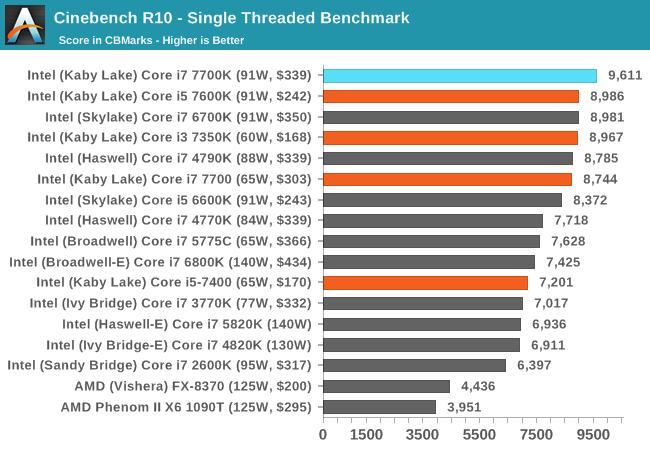
For a few years I was under the impression that CineBench’s workload was not amenable to more IPC increases, as we hovered around 7000 pts with new microarchitectures not making much of a difference. Being high frequency the i7-7700K pulls out a lead here, but it’s worth noting that Kaby Lake as a whole scores well, perhaps indicating that other features (such as frequency speed changing) can help.
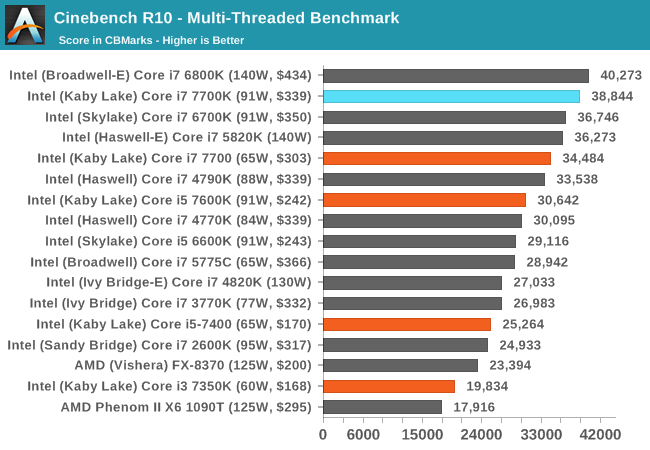
The multithreaded test gives different results, as this test typically prefers many cores. Rather than the new Cinebench tests dividing the scene up into over a hundred pieces (depends on threads), CB10 purely divides the scene into exactly how many threads are present. If a thread finishes early, it will try and cut the work of another thread in half. This sort of approach to multithreading has a different approach to frequency, cores and IPC, hence why R11.5 and R15 do bigger separations with core workloads.
Cinebench R11.5
CB11.5 has been popular for many years as a performance test, using easy to read and compare numbers that aren’t in the 1000s. We run the benchmark in an automated fashion three times in single-thread and multi-thread mode and take the average of the results.
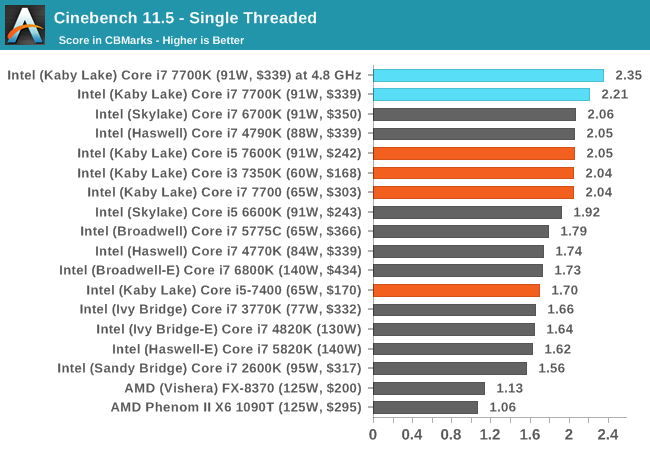
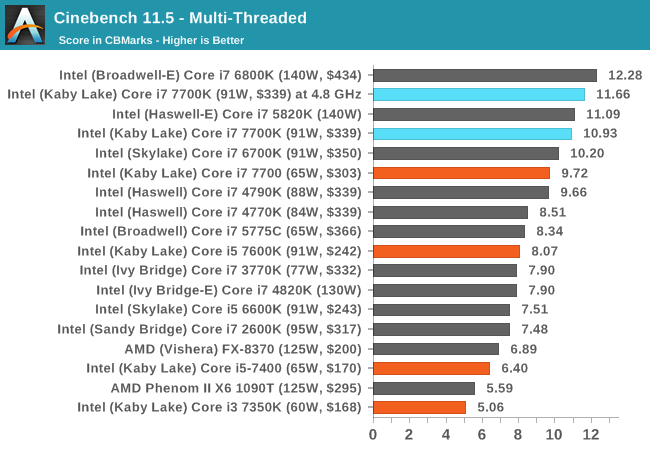
Similar to other tests, the i7-7700K takes the single thread crown, again beating an overclocked Devil’s Canyon i7-4790K, showing the out-of-the-box performance. Again, Kaby Lake as a whole seems to do well here, thanks to 4.2 GHz turbo modes on the i5-7600K and i3-7350K.
7-zip
As an open source compression/decompression tool, 7-zip is easy to test and features a built-in benchmark to measure performance. As a utility, similar to WinRAR, high thread counts, frequency and UPC typically win the day here.
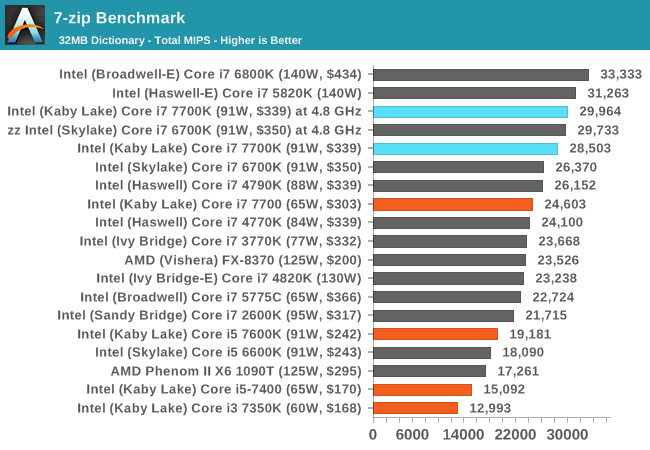
The Core i7-7700K shows the benefits of frequency over a stock i7-6700K, however at the same frequency they perform roughly the same as expected.
POV-Ray
Ray-tracing is a typical multithreaded test, with each ray being a potential thread in its own right ensuring that a workload can scale in complexity easily. This lends itself to cores, frequency and IPC: the more, the better.
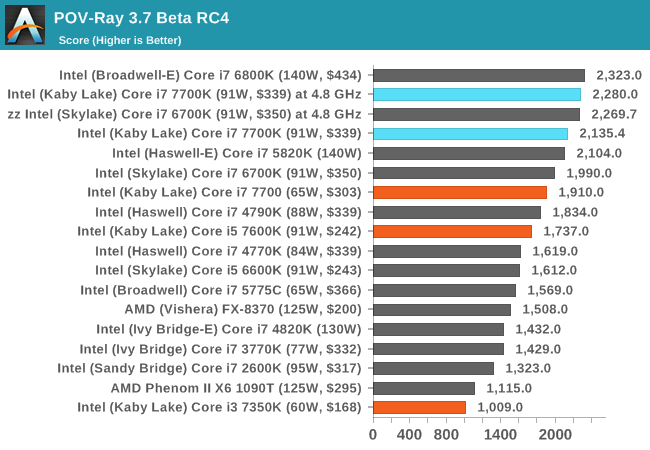
AES via TrueCrypt
Despite TrueCrypt no longer being maintained, the final version incorporates a good test to measure different encryption methodologies as well as encryption combinations. When TrueCrypt was in full swing, the introduction of AES accelerated hardware dialed the performance up a notch, however most of the processors (save the Pentiums/Celerons) now support this and get good speed. The built-in TrueCrypt test does a mass encryption on in-memory data, giving results in GB/s.
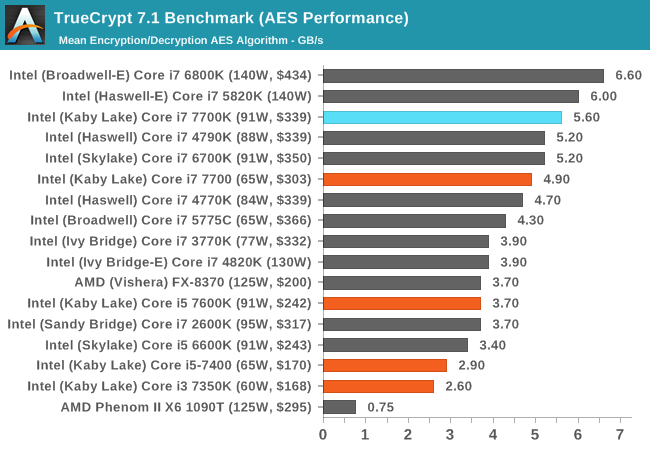
The encryption benchmark loves both threads and memory bandwidth, so we see the extreme processors pull out large leads due to 6+ cores and four memory channels. However, we see a similar picture as before to the Devil’s Canyon part: an out-of-the-box Core i7-7700K will beat an overclocked Core i7-4790K at 4.7 GHz.










125 Comments
View All Comments
Ian Cutress - Wednesday, January 4, 2017 - link
The boards will default to DDR4-2133 as a base memory frequency, regardless of processor. JEDEC has profiles for 2133 and 2400, and Kaby Lake is compatible with the JEDEC DDR4-2400 profile. So in order to achieve this, we use kits that offer DDR4-2400 JEDEC memory profiles via XMP. Enable XMP, and you're at the frequency that's officially supported by the processor, which is JEDEC. Out of the box usually refers to the BIOS, as we tend to eschew special 'media' BIOSes that might adjust certain performance parameters.ccdrop - Tuesday, January 3, 2017 - link
I just wanted to give you guys a super big THANK YOU! for testing under Windows 7 64-bit SP1, now I can be excited about the 7700k again!My big worry was that the 7700k was going to be a useless upgrade from my 2600K due to the whole "not officially support" drama as I flat have no interest in windows 10 (Please don't reply with Pro-10 comments I will never read them as I will never check these comments again I am just here to say thank you, along with the fact I have a laundry list about a mile long as to why I despise 10, I have thoroughly tested it for my use cases and it is a very solid downgrade. I am not a gamer so do it for the games is meaningless. As for security, my main workstation isn't attached to any networks and if you have local access to the system 10 is no better then 7, finally as for doing it for the "new features" just because you know new features are new... I will wait and see if the 7700k really runs 10~20% better on Windows 10 than windows 7 WITH MY SOFTWARE not games or things I don't use, then I'll switch. However as of now on my current hardware Windows 10 runs about 10~20% slower then windows 7 with my software, and is vastly more prone to errors and workflow interruptions.)
negusp - Thursday, January 5, 2017 - link
stfu, it is a pretty useless upgrade. 10-20% over a 2600k is nothing to be excited about.wait for Ryzen or Cannonlake. if you think your 2600k is anywhere near obsolete you have to be kidding me.
fm13 - Thursday, January 5, 2017 - link
I'm still using my i7 860 which is still OK at stock frequencies.The_Assimilator - Tuesday, January 3, 2017 - link
AnandTech reviews that are on time, what sorcery is this? I sincerely hope to see more of it this year!just4U - Wednesday, January 4, 2017 - link
I do not recall Ian ever being late to the party on his reviews...Thatguy97 - Wednesday, January 4, 2017 - link
Ryan is always lateRemember Fiji? And the "on the way" gtx 950 review?
Toss3 - Tuesday, January 3, 2017 - link
"In most of our benchmarks, the results are clear: a stock Core i7-7700K beat our overclocked Core i7-4790K in practically every CPU-based test (Our GPU tests showed little change)."Wait the 4790K was overclocked? You didn't mention the clockspeed anywhere. And how can a 5820K be faster than a 6800K (Grid: Autosport on MSI R9 290X)? You really need to let your readers know what speeds these CPUs are running at.
Thatguy97 - Tuesday, January 3, 2017 - link
No fucking increase in IPCDamn we need some competition bad and shame on anandtech for not ragging on Intel for lack of innovation
ThomasS31 - Tuesday, January 3, 2017 - link
Thanks... though it would be time to upgrade the GPU part to at least a GTX1080 or more like a TXP... I see on other tests, that those, especially the TXP shows some differences in high end gpus more. GTX980 is limiting these days too heavy.